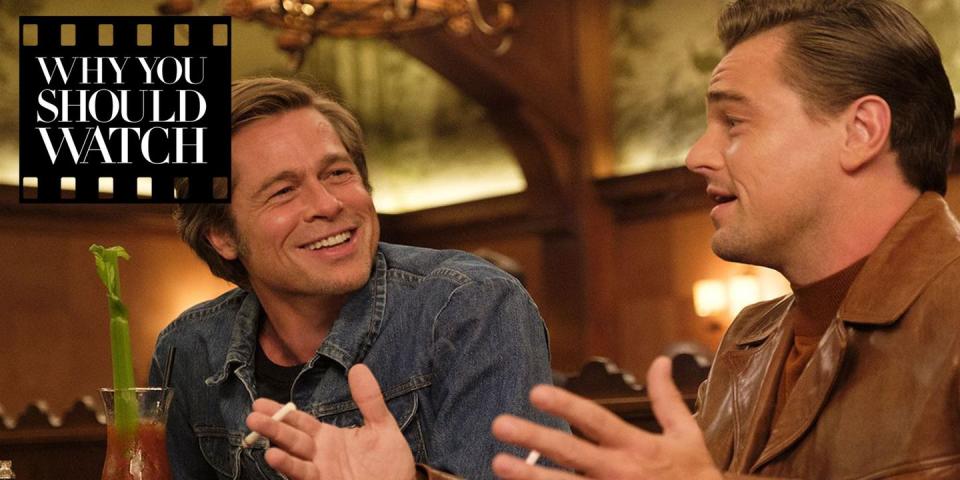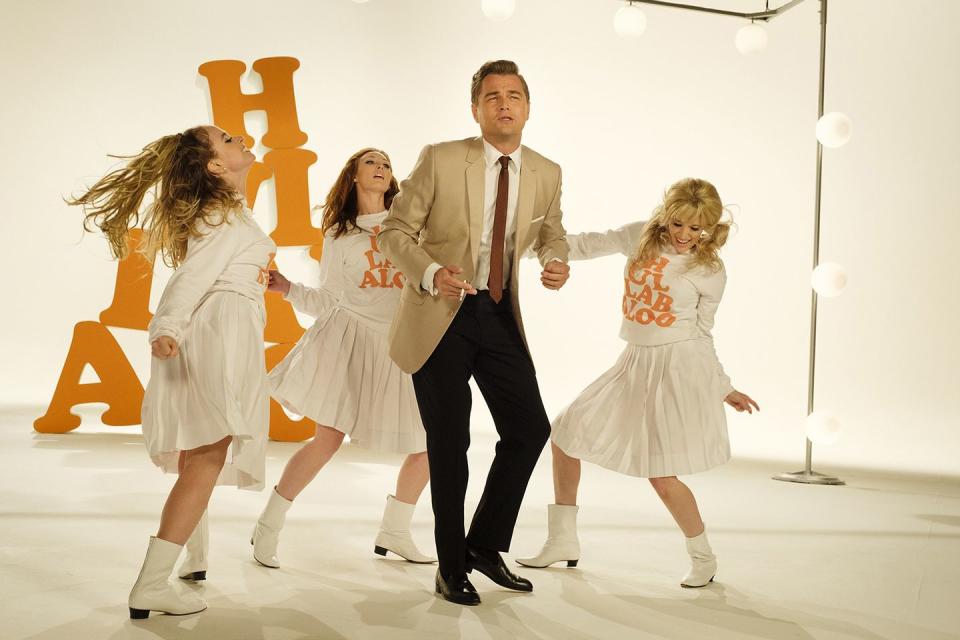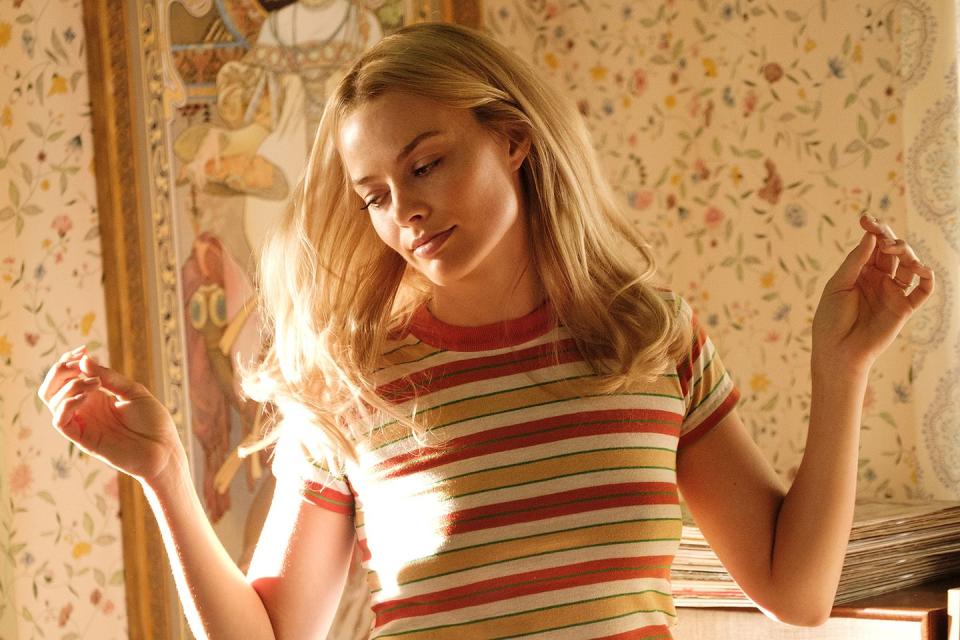Why you should watch... Tarantino’s effortlessly cool Once Upon a Time in Hollywood

The reign of the middle-aged white man is gradually coming to an end, so what does that mean for Quentin Tarantino, a director who burst onto the scene as an enfant terrible in the Nineties and has since carved himself out a niche in the movie-making establishment? In his ninth, and allegedly penultimate, feature Once Upon a Time in Hollywood (whose very trappings as an original movie shot on celluloid and banking on its star power hark back to the cinema of yesteryear), the film-maker stares down his own impending obsolescence, infusing the work with an unexpected poignance, a nostalgic yearning for a motion-picture paradise lost.

Once Upon a Time languidly unspools over three days in 1969, a golden time when movies cost 75¢, cigarettes are dipped in acid and barefoot Manson girls hitch rides along sun-soaked boulevards. Tarantino delights in amassing these details in the lush production design, piling period-specific pastiche atop paraphernalia to dazzling effect. The film is a rambling tale of epic proportions – crammed with winking B-movie-inspired vignettes and drawn-out scenes of Cadillacs cruising down freeways – that centres on the washed-up TV cowboy Rick Dalton (Leonardo DiCaprio) and his body double/handyman Cliff Booth (Brad Pitt) as they struggle to bolster the former’s waning career by reluctantly transitioning into movies.
It is nothing short of thrilling to see DiCaprio and Pitt onscreen together, each leading man propping up the other as “more than a brother, a little less than a wife” in a remarkably realised two-hander. The pair exudes an easy, companionable chemistry that is simply riveting: whether they’re kicking back with a few beers to watch FBI or Cliff is gently building up Rick’s crumbling confidence before a shoot.
Pitt’s prowess for comedy – best showcased in his roles as a dim, money-grabbing personal trainer in Burn After Reading and a swaggering Nazi hunter in Inglourious Basterds – all too often goes underappreciated. In his portrayal of Cliff, smilingly carrying Rick’s increasingly hefty emotional load, it is impossible to overlook the deftness of Pitt’s comic timing as he halts his counterpart’s spiralling neuroses with perfectly delivered put-downs (“Don’t cry in front of the Mexicans”). Pitt’s performance is captivating, a smoothly mellow synergy of charisma and charm, but it is DiCaprio who steals the show, cementing his status as the best actor of his generation and, according to The Hollywood Reporter, the last true movie star we have in this franchise-led era.

DiCaprio may be at the height of his powers, Once Upon a Time marking his return to the silver screen following his long-overdue Oscar win, and yet his character is on a downward trajectory, an alcoholic with undiagnosed bipolar flailing for relevance in an industry indifferent to his crisis. (In many ways, the fading star could be interpreted as a stand-in for Tarantino himself: an artist steadfastly stuck in his ways, refusing to kowtow to the zeitgeist.)
Rick is surrounded by memories of his glories past that only exacerbate the depth of his decline. His stylish home on Cielo Drive is decked out with mementoes of his former greatness, his own face almost judgementally looking down on him from the movie posters and magazine covers mounted on the walls, as if asking their now-dishevelled self, “Do you really need an eighth whiskey sour?”. DiCaprio disappears into Rick, demonstrating a complete lack of vanity as he stammers and wheezes his way through scenes, snotting up phlegm and slurping frozen margaritas out of a blender with a buffoonish indignity.
And, just like Pitt, he’s marvellously funny – an early scene of him bemusedly handling a flamethrower will have you erupting into laughter. In contrast to his co-star, who operates on free-flowing good vibes, DiCaprio’s humour tends to dip into the most soul-baring self-loathing. This comes to the fore when Rick has a temper-tantrum in his trailer after fluffing his lines on set. Captured in a series of rapid cuts, the sequence shows him screaming at his reflection and smashing up his belongings in an amusingly melodramatic fit. Then he threatens to commit suicide if he doesn’t nail the next take. This crushing realisation of the extent of his despair truncates our pleasure and plays into the undercurrent of violence omnipresent in all Tarantino movies (although, on the whole, this one’s brutality is less pronounced than its predecessors).

And what of Margot Robbie, you ask? She plays the actress Sharon Tate, who happens to be Rick’s neighbour, sharing a lavish mansion on Beverly Hills with her husband Roman Polanski. As I’ve said before, her screen time is frustratingly brief and largely silent. Once Upon a Time has edited in extra footage since its Cannes debut, although those additional minutes have mainly been allocated to the Western mise-en-abymes; Robbie’s part is still very small. However, within its confines, she does a laudable job, shading in her character with a buoyant corporeality and breezy optimism, dancing in and out of frame.
Watching Once Upon a Time is like flicking through a storybook, but instead of fairy-tale settings and moral imperatives, there are sweet-talking agents, drive-in theatres, dirty feet propped up on dashboards. Tarantino pieces together all these distinct elements to write a fantastically vibrant alternative history of Tinseltown in the Sixties, a love letter to cinema generally but also a fond remembrance of his own decorated oeuvre. By leaning into his insecurities for the future, the director has produced his most personal film to date. Once Upon a Time in Hollywood is a masterful achievement that is sure to be dissected by generations of movie-goers to come.
‘Once Upon a Time in Hollywood’ is released in cinemas on Friday.
You Might Also Like

 Yahoo Movies
Yahoo Movies 